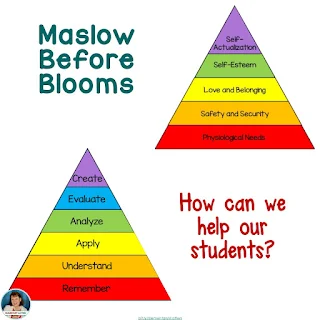Maslow Before Bloom's.
Maslow's Hierarchy of Needs and Bloom's Taxonomy are two of the most widely known theories relating to human development and learning.
Maslow's Hierarchy of Needs emphasizes the importance of fulfilling physical, emotional, and psychological needs to achieve self-actualization.
Let's talk about these parts!
Our fundamental needs are quite simple. We all need air, water, food, health care, shelter, and sleep in order to survive and maintain a healthy life.
As the world continues to evolve and change, one thing becomes increasingly clear: safety and security needs are at an all-time high. From personal security and property protection to ensuring the safety of family members, it is essential for individuals to stay aware and be proactive about their safety. This need has become stronger in the classroom, as children are exposed to and practice "active shooter" drills. It's a scary world.
Humans have an innate need to feel a sense of belonging, friendship, and family. It's a basic fundamental that serves an important role in our day-to-day lives. Whether it's having someone to talk to or spending quality time with loved ones, these connections are essential for feeling secure and content. Morning meetings and Team Building Games are great for building a sense of belonging in the classroom.
Self-actualization occurs when an individual exercises their full potential and accepts themselves for who they are. According to Maslow’s theory, humans strive to reach their utmost potential by discovering purpose in life and accepting themselves at all stages of development. Achieving this level of self-acceptance enables us to reach our full potential, bringing us a sense of fulfillment in life.
Can you hear the angels singing? Honestly, it's rare for small children to reach this stage of development. Seriously, not many adults have total self-actualization!
But we can work toward this with our students, can't we?
Bloom's Taxonomy categorizes different levels of thinking and learning objectives that an individual must achieve to effectively process information.
When I went to college (many moons ago), that is what Bloom's Taxonomy looked like.
Now it looks like this! I like the new one, since the keywords are all verbs! It's much easier to think about how we can help students achieve these levels.
Let's explore these levels:
At its most basic level, Bloom's Taxonomy requires students to recall facts and memorize them. This involves repeating information until it can be recalled with ease. We're talking the very basics, from letters and their sounds, to memorizing math facts, to states and their capitals, or even the periodic table!
Understanding requires the learner to go beyond that surface-level comprehension and dig into higher-order thinking skills such as summarizing information, identifying key points from a text they read or heard about, describing the main themes from a video they watched, discussing subtle aspects of an article or book they read or paraphrasing complex ideas in their own words. There's a lot more thinking involved here!
Applying involves taking knowledge from one context and applying it in another context. It requires students to think beyond a basic understanding or mere memorization of facts; instead, they must demonstrate their ability to take information and apply it in new situations.
Students can justify their position on a particular issue by organizing their thoughts into logical arguments that are supported by evidence.
At the highest level of Bloom's Taxonomy, producing original work and inventing something new requires learners to synthesize ideas from multiple sources and devise unique solutions or products. This involves carefully analyzing facts and details, drawing inferences, making comparisons, creating abstractions, and more. This is the level teachers strive for with their students.
So what can we do to help our students?
The best we can. That's all we can do... the best we can.
We can make them feel safe, loved, important, and special.


















